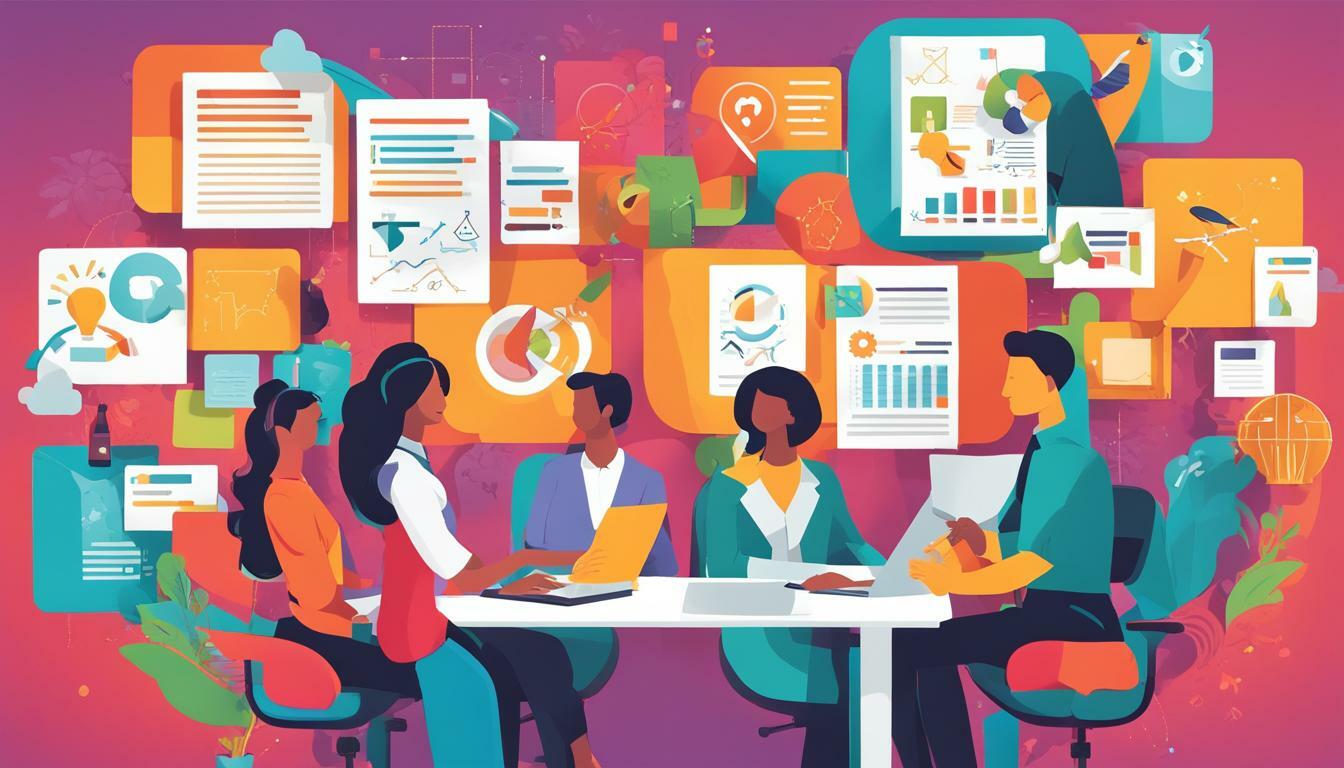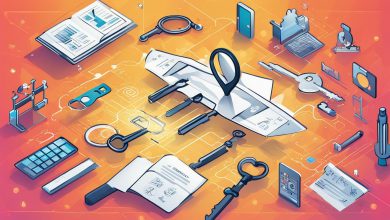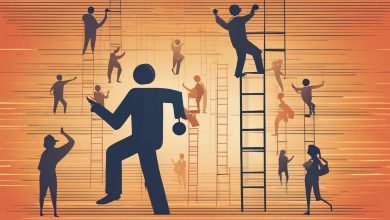
Welcome to our article on the importance of refining communication and collaboration skills for professional success. In today’s fast-paced work environment, effective communication and collaboration abilities are essential for achieving career goals. By refining these skills, individuals can enhance productivity, build strong relationships, and make significant contributions to their organizations.
In this section, we will explore effective communication techniques and strategies to improve collaboration skills. By the end of this section, you will have a clear understanding of why enhancing communication and collaboration skills is crucial for professional success and how you can achieve it.
Key Takeaways
- Refining communication and collaboration skills is crucial for professional success.
- Effective communication techniques and strategies can enhance collaboration skills.
Why Communication and Collaboration Skills Matter?
Communication and collaboration skills are vital to success in any professional setting. Effective communication strategies and teamwork and collaboration abilities are essential for building strong relationships, fostering a positive workplace culture, and increasing productivity.
One of the key benefits of teamwork and collaboration is the ability to pool knowledge and resources to achieve common goals. A team that collaborates successfully can tackle larger projects faster, with higher quality, and more efficiently than an individual working alone. Collaboration also promotes a healthy and positive workplace culture by fostering a sense of community and shared ownership of projects.
Enhancing communication skills is equally important for success in any career. Clear communication is essential for sharing ideas, expressing concerns, and ensuring that everyone in the team is on the same page. Effective communication strategies also help to prevent misunderstandings, errors, and conflicts that can arise due to miscommunication.
Improving communication and collaboration skills requires dedicated effort and practice. By implementing effective communication techniques, fostering teamwork and collaboration, and enhancing communication skills, individuals can improve productivity and build strong relationships that support professional success.
Developing Effective Collaboration
To achieve success in any workplace, it’s crucial to develop effective collaboration and teamwork skills. This involves a range of elements that enable team members to work together efficiently and harmoniously to achieve their goals.
Teamwork and Collaboration
Teamwork and collaboration are the building blocks of any successful team. To achieve effective collaboration, team members must have a shared vision and common goals. It’s also important to ensure that each team member has clearly defined roles and responsibilities and that everyone is aware of what’s expected of them.
An environment of trust and respect is also crucial for effective teamwork and collaboration. This means that team members should be able to express their opinions freely and be open to constructive feedback from their colleagues.
Techniques for Developing Effective Collaboration
There are several techniques that can be used to develop effective collaboration. One of these is to encourage regular communication between team members. This can be achieved through regular team meetings, one-to-one catch-ups, and the use of collaboration tools such as instant messaging and video conferencing.
Another effective technique is to establish a culture of accountability within the team. This involves making sure that team members are aware of their responsibilities and are held accountable for their actions. By doing so, team members will be more motivated to work together and contribute to the team’s success.
Enhancing Communication Skills
Effective communication is at the heart of effective collaboration. By enhancing communication skills, team members can work together more effectively, share ideas, and achieve their goals.
There are several ways to enhance communication skills, such as attending communication skills training, practicing active listening, and using clear and concise language. By doing so, team members can ensure that they are communicating effectively and are able to build strong relationships based on trust and respect.
| Key Points | Actions |
|---|---|
| Developing effective collaboration involves teamwork and communication skills | Encourage regular communication, establish a culture of accountability, attend communication skills training |
| Effective collaboration requires trust and respect among team members | Share a common goal, offer constructive feedback, practice active listening |
| Enhancing communication skills is crucial for successful collaboration | Use clear and concise language, attend communication skills training, practice active listening |
Mastering Effective Communication Techniques
Effective communication is crucial for career success. By mastering communication techniques, you can improve your ability to convey your message clearly, understand others better, and work collaboratively with others. Communication skills training is a great way to refine your communication abilities and enhance your professional growth.
Here are some effective communication techniques:
- Active Listening: Paying attention to what others say and asking relevant questions is essential for effective communication. When you listen actively, you demonstrate respect and empathy for the speaker, and you can understand their point of view better.
- Clarity and Brevity: Clear and concise communication is essential for effective communication. Avoid using jargon or complex terms that can confuse others. When you explain your ideas in simple terms, it makes it easier for others to understand and respond.
- Body Language: Non-verbal cues such as facial expressions, hand gestures, and posture can convey a message that is just as strong as words. Paying attention to your own body language and being aware of others’ can help you communicate more effectively.
- Empathy: Empathy is the ability to understand and share the feelings of another. It is a powerful tool for enhancing communication and building rapport with others. When you show empathy, you can foster a deeper understanding of others’ perspectives and needs.
By mastering these communication techniques, you can enhance your communication skills and become a more effective communicator. Additionally, communication skills training can provide you with valuable feedback and guidance, helping you refine your skills and achieve your professional goals.
Navigating Communication Challenges in the Workplace
Effective communication in the workplace is essential to achieving success. However, communication challenges can arise without warning, causing misunderstandings, conflicts, and decreased productivity. Here are some communication strategies to overcome common workplace communication challenges and enhance communication skills:
1. Active Listening
Active listening is a crucial skill in effective communication. By giving your full attention to the speaker, you can ensure that you fully understand their message. To enhance your active listening skills, practice focusing on the speaker, maintaining eye contact, and asking clarifying questions if needed. Active listening can help prevent misunderstandings and establish trust among team members.
2. Clarify Expectations
Unclear expectations can lead to miscommunication and frustration. To avoid this, make sure you and your team clearly understand what is expected of you. Ensure that goals and deadlines are communicated clearly, and that everyone has an opportunity to ask questions and seek clarification if needed. This can help prevent misunderstandings and ensure everyone is working towards the same objective.
3. Use Positive Language
Using positive language can help create a more positive work environment and build stronger relationships among team members. Instead of focusing on what cannot be done, focus on what can be done, and offer solutions instead of complaints. Using positive language can help reduce conflicts and increase productivity.
4. Be Open and Honest
Open and honest communication is vital to building trust among team members. When communicating, be transparent about your thoughts and feelings, and encourage others to do the same. This can help prevent misunderstandings and build more meaningful relationships within the team.
5. Use Technology to Your Advantage
In today’s digital age, technology can be used to facilitate effective communication. Make use of video conferencing, instant messaging, and other digital tools to communicate with your team, especially when working remotely. However, remember that face-to-face communication is still important for building strong relationships and trust.
By implementing these communication strategies, you can enhance your communication skills and navigate communication challenges in the workplace effectively.
Strengthening Teamwork and Collaboration
Collaboration is a vital component in achieving success in the workplace. By working together, teams can increase productivity, generate innovative ideas, and achieve their goals effectively. To enhance collaboration skills, it’s essential to adopt collaboration techniques that ensure seamless communication and teamwork.
One of the most effective techniques is creating a shared vision that aligns with the team’s goals. Having a common understanding of the team’s objectives helps team members prioritize their tasks and work towards a common goal. This can be achieved by holding regular team meetings, setting team goals, and discussing ways to achieve them.
Another technique that can improve collaboration skills is dividing tasks based on individuals’ strengths and interests. This ensures that each team member brings their best to the task, resulting in the best possible outcome. Additionally, it helps in reducing stress and workload among team members, which in turn leads to increased motivation and job satisfaction.
Clear communication is crucial in promoting effective collaboration. Teams can achieve this by ensuring that all members have a clear understanding of their roles and responsibilities, as well as the project’s timeline and expectations. Additionally, it’s important to establish channels of communication that are easily accessible to all team members. This includes using email, instant messaging, or video conferencing tools that are suitable for remote teams.
Lastly, encouraging active participation and feedback from all team members helps promote a culture of collaboration. By allowing everyone to contribute their ideas and share their opinions, the team can generate a diverse range of solutions that could not have been achieved by individual efforts. It’s important to foster an environment that values ideas and contributions from all members, regardless of their roles or positions.
In conclusion, improving collaboration skills is vital for achieving success in the workplace. By adopting collaboration techniques, encouraging clear communication, and promoting active participation, teams can enhance their productivity and generate innovative solutions.
Effective Communication for Remote Teams
Remote collaboration has become increasingly common in many workplaces, especially in the wake of recent events. While it offers many benefits, it also presents unique communication challenges that can impact productivity and collaboration.
To enhance communication skills in a remote setting, it’s essential to implement effective communication techniques. Keep these tips in mind:
- Use technology to your advantage. Utilize tools like video conferencing, instant messaging, and collaborative project management software to stay connected with team members.
- Establish clear expectations. Set guidelines for communication, including preferred communication channels, response times, and availability.
- Practice active listening. Ensure that you are fully present and engaged during virtual meetings and conversations.
- Clarify messages. In remote communication, messages can be easily misunderstood. Be clear and concise to avoid confusion.
- Encourage feedback. Encourage team members to provide feedback about remote communication processes and listen to their suggestions.
By embracing these techniques, remote teams can enhance communication skills, maintain productive collaboration, and achieve success.
Building Trust and Rapport through Communication
Effective communication is not just about exchanging information; it is also about building trust and rapport among team members. Trust is the foundation on which successful collaboration and teamwork are built. Therefore, it is crucial to establish and maintain trust among team members to enhance collaboration and productivity.
One of the most effective ways to build trust and rapport is through active listening. When team members feel heard and understood, they are more likely to trust and respect one another. Encouraging open and honest communication also fosters trust. When team members share their thoughts and ideas freely, they feel valued and respected, which strengthens their commitment to the team’s goals.
Another way to build trust is by being reliable and consistent in communication. This means responding promptly to emails and messages, keeping team members informed about project updates, and following through on commitments. When team members can depend on each other, they are more likely to trust and rely on one another.
Finally, acknowledging and appreciating team members’ contributions and successes can also build trust and rapport. Celebrating achievements and recognizing hard work can foster a positive team culture and strengthen relationships.
By incorporating these effective communication techniques into your communication style, you can establish and maintain trust and rapport among team members, enhancing collaboration, teamwork and productivity.
The Role of Active Listening in Communication
Effective communication is not only about being able to articulate your thoughts and ideas clearly, but also about actively listening to others. Active listening is the process of fully engaging with the person speaking, taking in their words and understanding their perspective.
By practicing active listening, you can enhance your communication skills and build stronger relationships with your colleagues. Here are some effective communication techniques that can help you improve your active listening skills:
- Focus on the speaker: Pay attention to the speaker and avoid distractions such as your phone or computer.
- Ask clarifying questions: If you don’t understand something, ask the speaker to clarify their message.
- Use nonverbal cues: Show that you are engaged by maintaining eye contact, nodding your head, and using other positive body language.
- Rephrase and repeat: Recap what the speaker has said in your own words to show that you have understood their message.
Communication skills training can also help you develop your active listening skills. Through training, you can learn how to become a more effective listener and how to use active listening techniques to enhance your communication with others.
Improving your active listening skills can have a significant impact on your communication and collaboration with others. Not only can it help you understand others better, but it can also foster trust and build stronger relationships within your team.
Fostering a Culture of Open Communication
Establishing a culture of open communication within organizations is a crucial component of effective collaboration and teamwork. By promoting transparency and honesty, team members feel valued and empowered, leading to increased productivity and a positive work environment.
One of the most effective communication strategies to foster a culture of open communication is to encourage feedback and constructive criticism. Creating a safe space for team members to voice concerns or offer suggestions is essential for building trust and rapport.
Using active listening techniques can also facilitate open communication. By actively listening to team members’ ideas and concerns, individuals feel heard and understood, leading to a more collaborative and respectful work environment.
It’s important for organizations to establish clear and concise communication guidelines to minimize misunderstandings and promote transparency. This includes utilizing technology to improve communication, such as using chat platforms or video conferencing for remote collaboration.
By fostering a culture of open communication, organizations can effectively promote teamwork and collaboration, leading to increased productivity and a positive work environment.
Conclusion
Effective communication and collaboration skills are essential for career growth and success. By refining these skills, individuals can improve productivity, build strong relationships, and achieve their goals. Strategies such as fostering open communication, developing effective collaboration techniques, and mastering effective communication techniques are key to enhancing these skills.
Active listening, building trust and rapport, and enhancing communication skills through training can also play a significant role. Additionally, remote teams should be mindful of unique communication challenges and embrace effective communication strategies that support remote collaboration.
In conclusion, enhancing communication and collaboration skills is critical for achieving professional success. By implementing these strategies, individuals can strengthen their ability to communicate effectively, foster a collaborative and productive work environment, and ultimately achieve their career goals.
FAQ
Q: Why are communication and collaboration skills important?
A: Communication and collaboration skills are crucial in the workplace as they enhance teamwork, improve productivity, and foster positive relationships among team members. Effective communication allows information to be exchanged clearly and efficiently, while collaboration skills ensure that individuals can work together effectively towards a common goal.
Q: How can I develop effective collaboration?
A: Developing effective collaboration involves creating a supportive environment, establishing clear goals and expectations, encouraging open communication, and promoting teamwork. It is important to foster trust and respect among team members, and to actively listen and value different perspectives. Regular team-building activities and training programs can also help in developing and maintaining strong collaboration.
Q: What are some effective communication techniques?
A: There are several effective communication techniques that can improve your ability to convey information clearly and understand others. These include active listening, using positive body language, being concise and clear in your message, asking clarifying questions, and providing feedback. It is also important to adapt your communication style to different audiences and situations.
Q: How can I navigate communication challenges in the workplace?
A: Communication challenges are common in the workplace, but can be overcome with certain strategies. It is important to address conflicts or misunderstandings promptly and directly, to clarify expectations and goals, and to establish open channels of communication. Developing empathy and understanding different communication styles can also help in navigating challenges and maintaining positive relationships.
Q: How can I enhance communication skills in a remote team?
A: Effective communication in a remote team requires utilizing various communication tools and techniques. It is important to establish regular check-ins and meetings, use video conferencing whenever possible, and ensure that all team members have access to necessary information and resources. Additionally, maintaining clear and open channels of communication, and fostering trust and collaboration through virtual means, are essential for successful remote team communication.
Q: How can I build trust and rapport through communication?
A: Building trust and rapport through communication involves being honest, reliable, and consistent in your interactions. It is important to actively listen, show empathy, and demonstrate respect for others’ opinions. Building personal connections, such as through casual conversations and team-building activities, can also contribute to trust and rapport within a team.
Q: What is the role of active listening in communication?
A: Active listening is an essential component of effective communication. It involves fully focusing on and understanding the speaker’s message, without interrupting or making assumptions. Active listening techniques include maintaining eye contact, nodding or providing verbal cues to show understanding, and asking thoughtful questions. By practicing active listening, you can enhance your communication skills and strengthen relationships.
Q: How can I foster a culture of open communication?
A: Fostering a culture of open communication requires creating an environment where individuals feel comfortable expressing their thoughts, opinions, and concerns. This can be achieved by encouraging transparent and honest communication, actively seeking feedback, providing opportunities for collaboration and idea-sharing, and embracing diversity of perspectives. It is also important for leaders to lead by example and model open communication behaviors.








